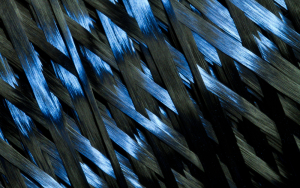
A European research project has been launched for the development of lignin-bases carbon fibres for use in composite fibre materials, in the form of a private-public partnership (PPP). ITCF Denkendorf is participating in the project, along with other renowned firms and research institutes from all over Europe. The aim of the so-called “LIBRE Project“ (Lignin Based Carbon Fibres for Composites) is the development of new, biobased composite materials: the intention is to develop raw materials for highly stable carbon fibre composites out of lignin derived from pulp and paper manufacture.
The usual raw material for producing carbon fibres has until now been polyacrylnitrile (PAN), which is derived from fossil resources. The replacement of PAN with biomaterials is an innovative way of meeting the increasing need for carbon fibre, in a resource friendly way. Lignin is ideal for this, since it occurs in large quantities as pulp, a waste product of the paper industry. In addition, the carbon content of lignin is high, thus fulfilling a prerequisite for the production of high quality carbon fibre.
Substituting the raw material is not the only aim of the research project: the so-called precursor fibres (fibres from the raw material) are transformed into carbon fibres in an energy-intensive and expensive thermal process. The new plan is to use microwaves and high-frequency radiation as efficient sources of heat. In this way, lignin-based carbon fibres could be produced significantly more competitively and cost-effectively.
A further aim of the project is to functionalise the surface of the fibres by means of a plasma. Plasma treatment is intended to replace liquid chemical treatment, providing a more energy- efficient and environmentaly friendly alternative. Surface activation improves the adherence of the fibres to the composite fibre matrix. This results in fibres of high specific strengths, suitable for a variety of uses in lightweight construction.
The ITCF Denkendorf has many years of expertise in the development and production of high performance fibres. In the joint project, the ITCF will be responsible for the precursor development, in cooperation with other partners. This will involve chemically functionalising the raw lignin in combination with further polymers, to develop a mechanically stable precursor fibre. For this, a cost-effective melt spin process developed by the ITCF will be used.
In further steps the precursor fibres will be stabilised and carbonised in a continuous process at the ITCF. This is to take place in plants especially configured for the processing of lignin. Industrial partners will further process the carbon fibres thus obtained into prototypes for the automotive and wind energy industrial sectors.
The public-private partnership ’Bio-Based Industries‘ is a joint undertaking between companies and research institutes, which aims to strengthen sustainable management in a bio-based industrial sector. The financial support for the LIBRE project comes from the EU, which supports research and innovative projects all over Europe through the investment programme ’HORIZON 2020‘. The project will be funded over a period of four years, to the sum of EUR 4,9 million. 12 project partners are involved.
Source
ITCF Denkendorf, press release, 2017-02-03.
Supplier
Bio-based Industries (BBI) Joint Undertaking
European Union
Horizon 2020
Institut für Textilchemie und Chemiefasern (ITCF)
Share
Renewable Carbon News – Daily Newsletter
Subscribe to our daily email newsletter – the world's leading newsletter on renewable materials and chemicals









